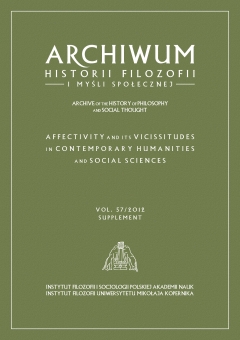Le cartésianisme de Philosophie et phénoménologie du corps de Michel Henry – entre cogito affectif et cogito intellectualiste
The Cartesianism of Michel Henry’s Philosophy and phenomenology of the body – Between the Affective Cogito and the Intellectualist One
Author(s): Wojciech StarzyńskiSubject(s): Contemporary Philosophy, Philosophy of Mind, Phenomenology
Published by: Instytut Filozofii i Socjologii Polskiej Akademii Nauk
Keywords: Michel Henry; Descartes; cogito; affectivity; union of soul and body;
Summary/Abstract: In this paper I intend to focuses the main points of the interpretation of Descartes offered by the early Michel Henry in his book Philosophy and phenomenology of the body. Henry’s „Cartesian way” took shape as part of its dialogue with Maine de Biran. Henry assumes the Cartesian cogito as essentially affective, a thesis which was already accepted by Descartes himself, but has been obscured by his intellectualist and objectivist attitude. In explaining the affective pattern of the cogito in contrast to Merleau-Ponty, Henry denounces the Cartesian doctrine of the union of soul and body, since, far from saving the corporeal nature of the subjectivity, condemns the cogito to its objectification.
Journal: Archiwum Historii Filozofii i Myśli Społecznej
- Issue Year: 2012
- Issue No: 57supl.
- Page Range: 229-239
- Page Count: 11
- Language: French

